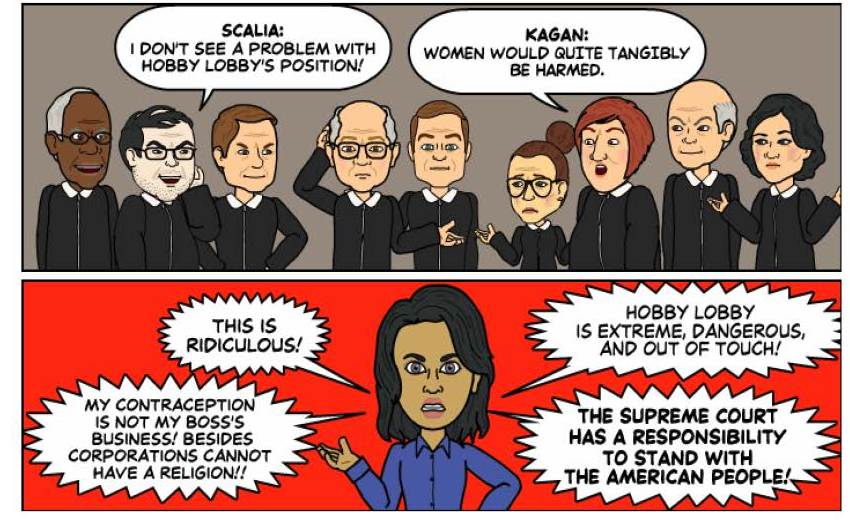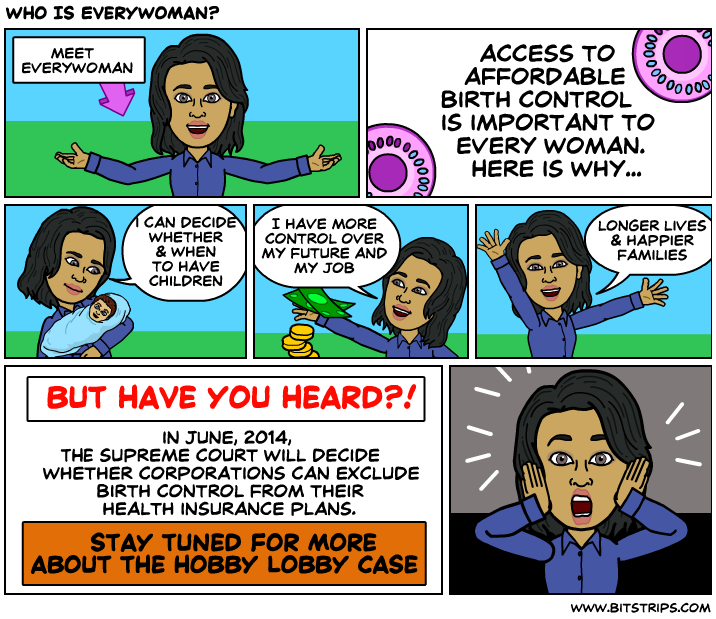The Supreme Court’s majority decision in the case of Hobby Lobby et al. presents serious threats to women’s rights, to the public’s health and the public order. Efforts to override the decision at the state and federal levels require energetic support.
As the dissent by Supreme Court Justice Ruth Bader Ginsburg, supported by dissenting Justices Breyer, Kagan, and Sotomayor, notes, “In a decision of startling breadth, the Court holds that commercial enterprises, including corporations…can opt out of any law (saving only tax laws) they judge incompatible with their sincerely held religious beliefs.”
The troubling ruling specifically grants a wide range of for-profit corporations the right to opt out of the federally mandated requirement to provide all FDA-approved contraceptives to employees through their health insurance plans, without co-payments and deductibles. If tolerated and uncontested, the ruling will:
- Re-instate financial barriers to the most expensive forms of contraception, which are also the most effective;
- Stigmatize contraception, which will depress effective use;
- Eliminate discussion of the negative impact on the health and interests of the people most affected, employees and women, by assigning human characteristics and religious beliefs and rights to corporations, which are by design a legal fiction.
Cost and stigma are barriers to health
Contraception is widely used and recognized as “a fundamental health care service and a basic public health measure. The ability to plan, start, space, and discontinue bearing children has transformed everyday life for women, families, and communities. Along with other improvements in medical care and public health, it has vastly enhanced women’s autonomy, professional and educational achievement, and emotional satisfaction and helped extend their life span… Mandates requiring wider insurance coverage for birth control are associated with more consistent use of contraception.”[1]
The major U.S. medical and health care professional associations recommend access to all FDA-approved contraceptive drugs and devices to safeguard the health of women, to reduce unintended pregnancy, as well as to protect the health of women for whom pregnancy may be hazardous, even life threatening.[2]
From 2008-2011, the rates of pregnancy, births and abortions all declined steeply in the U.S. “Contraceptive use improved during this period, as more women and couples were using highly effective long-acting reversible contraceptive methods, such as the IUD.” [3]
However, many women report that cost is a barrier to obtaining and using birth control consistently. Insertion of an IUD, the most reliable reversible form of birth control for women who tolerate it physically, and who choose it, can cost $1,000.
Sharp inequalities in the rate of unintended pregnancy persist, remaining 5 times higher for low-income women and women of color compared with higher-income and white women. Almost half of all pregnancies in the United States are unintended – an exceptionally high rate.[4] The ACA requirement waiving cost-sharing is essential.
In its 2011 final report of recommendations for women’s preventive health services to be included under the Affordable Care Act, ‘Clinical Preventive Services for Women: Closing the Gaps‘, the Institute of Medicine (IOM), found that stigmatizing access and coverage would increase even further the high rate of unintended pregnancies, and discriminate against women.
The Hobby Lobby owners believe that 4 selected methods of contraception are abortifacients. This is scientifically wrong in 3 cases, and questionable in a fourth. Nevertheless, Justice Alito says for the Court, on pp. 37-8: “it is not for us to say that their religious beliefs are mistaken or insubstantial,” as long as they reflect “an honest conviction.”
Granting for-profit corporations protection as religious minorities
The Hobby Lobby decision is startling in the absence of analysis of its likely negative impact on the health of the women employees for whom four effective and expensive contraceptives will no longer be available through their employer’s health insurance plans. Worse, the argument that won the day for the corporation would apply even if the corporation were opposed to providing any and all contraceptives to employees.
The Supreme Court decision fundamentally redefines corporations in a manner that privileges the views of business owners over those of other citizens.
A corporation is in essence a legal fiction, created to facilitate the business activities and purposes of groups of people by shielding them as individuals from the risk of liability that is the inevitable consequence of a business enterprise. The majority decision in Hobby Lobby, however, confounds this definition. It claims that a for-profit corporation can in fact have religious beliefs, because it is no more than an “association of a group of people.”
The legal standard developed by an earlier Supreme Court to protect “discrete and insular” religious minorities requires that the “least restrictive” course of action be taken to comply with a law.
The current decision analyzes the potential harm to Hobby Lobby from complying with the ACA’s contraception mandate strictly in terms of whether or not its religious objection to that law is sufficiently accommodated. The equation essentially asks, is the mandate to move corporate funds from one corporate bank account to an insurance company’s bank account more or less burdensome to the corporation’s preferred religious belief about contraception, compared with, for example, moving some of the corporation’s funds into its payment of taxes, and having the government cover some of the cost of the mandate?
The Court’s decision does not factor in the impact of the employer’s benefits choices on the vast majority of individuals who are not a corporation, but use contraceptives.
For these reasons and for the public health’s sake, efforts must be initiated and supported to override the decision by enforcing the mandate at the state and federal levels that health insurance plans must cover the full range of FDA-approved contraceptives at no additional cost to the individual.
[1] Shaffer ER, Sarfaty M, Ash AS. Contraceptive insurance mandates. Med Care. 2012 Jul;50(7):559-61.
[2] Jones R and Jerman J. Abortion Incidence and Service Availability in the United States, 2011. Guttmacher Institute. Feb, 1, 2014. http://www.guttmacher.org/media/nr/2014/02/03/
[3] Jones R and Jerman J. Abortion Incidence and Service Availability in the United States, 2011. Guttmacher Institute. Feb, 1, 2014. http://www.guttmacher.org/media/nr/2014/02/03/
[4] National Survey of Family Growth (Finer and Henshaw, 2006); cited in IOM (Institute of Medicine). 2011. Clinical Preventive Services for Women: Closing the Gaps. Washington, DC: The National Academies Press, p. 102.












